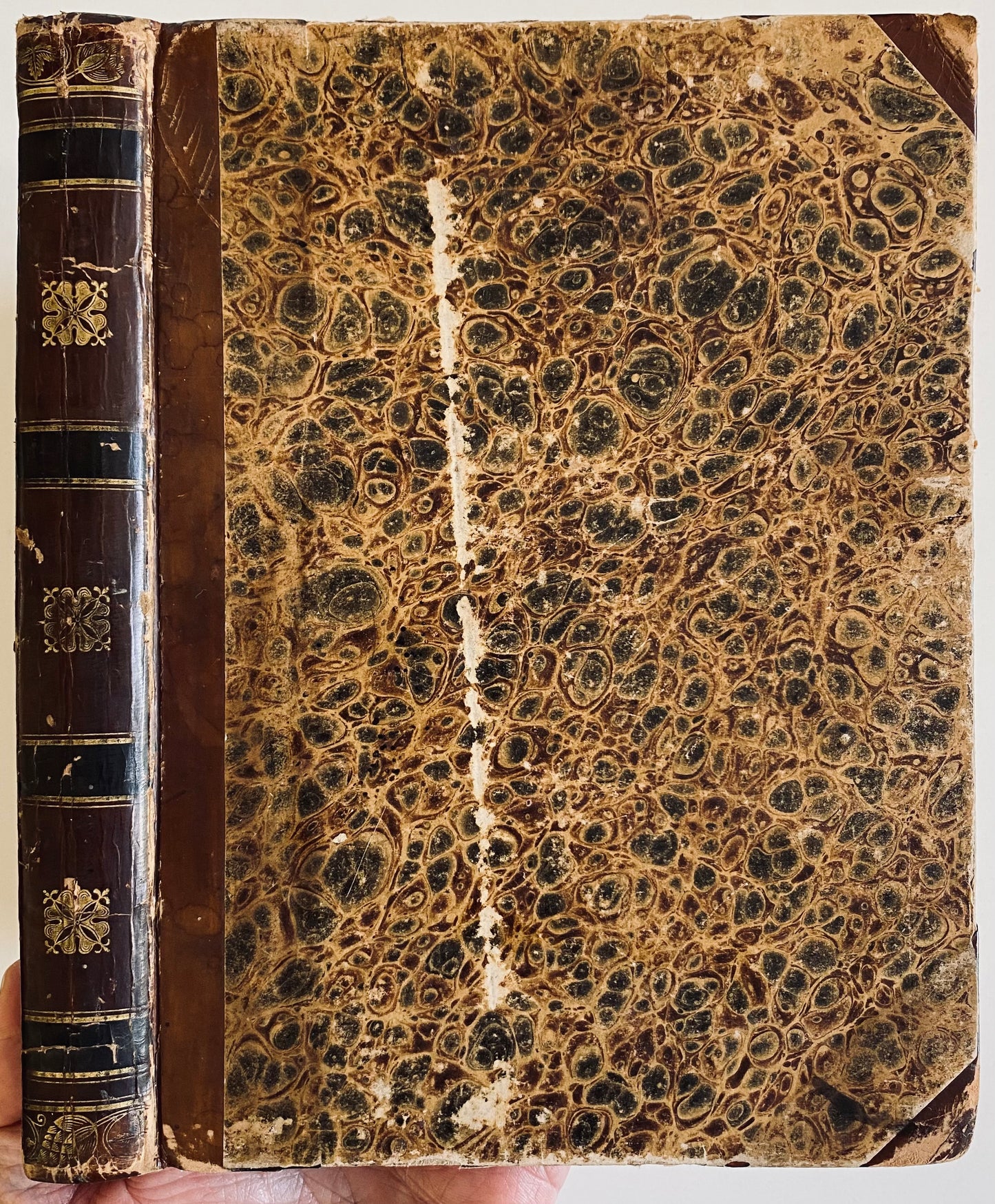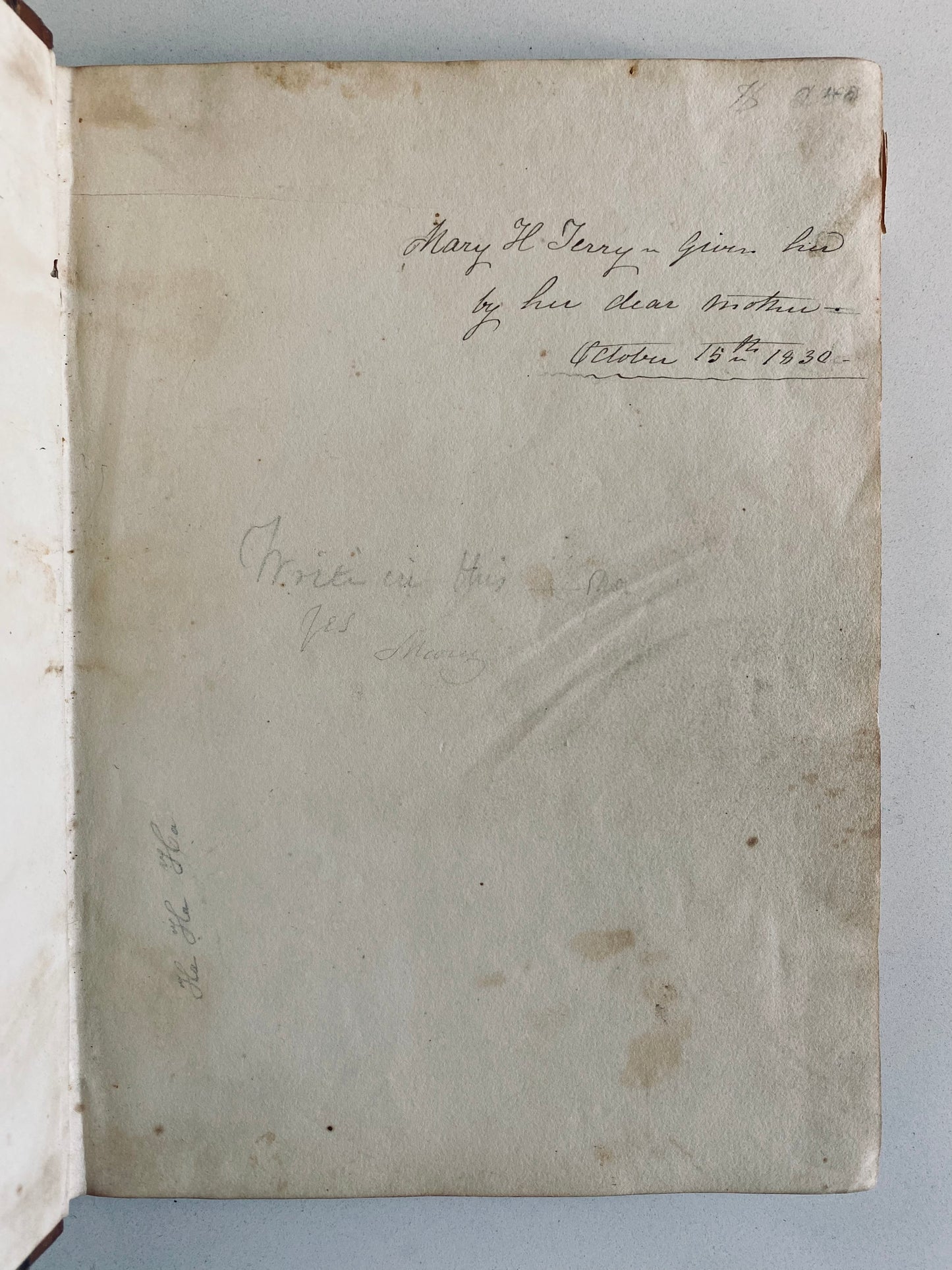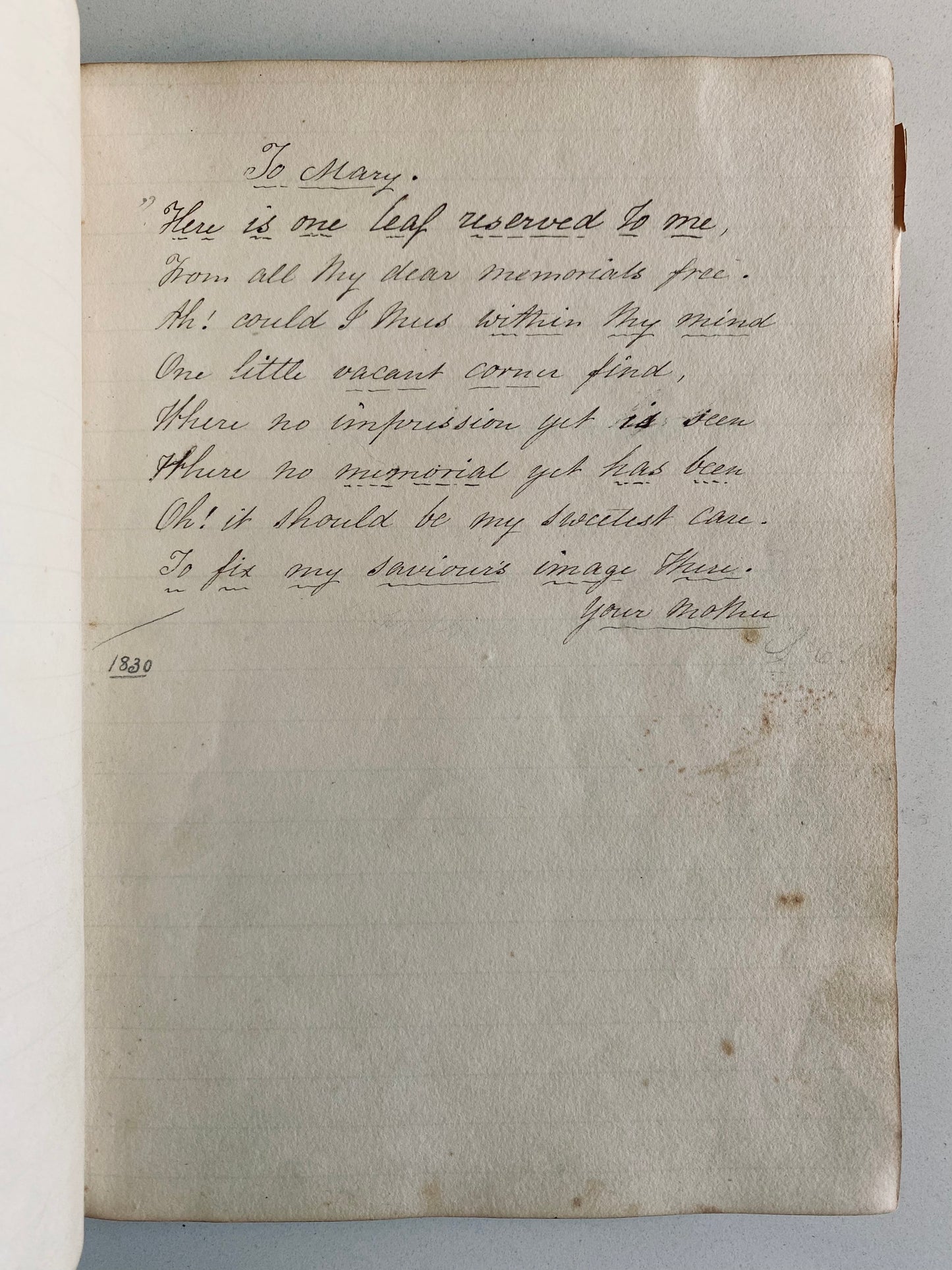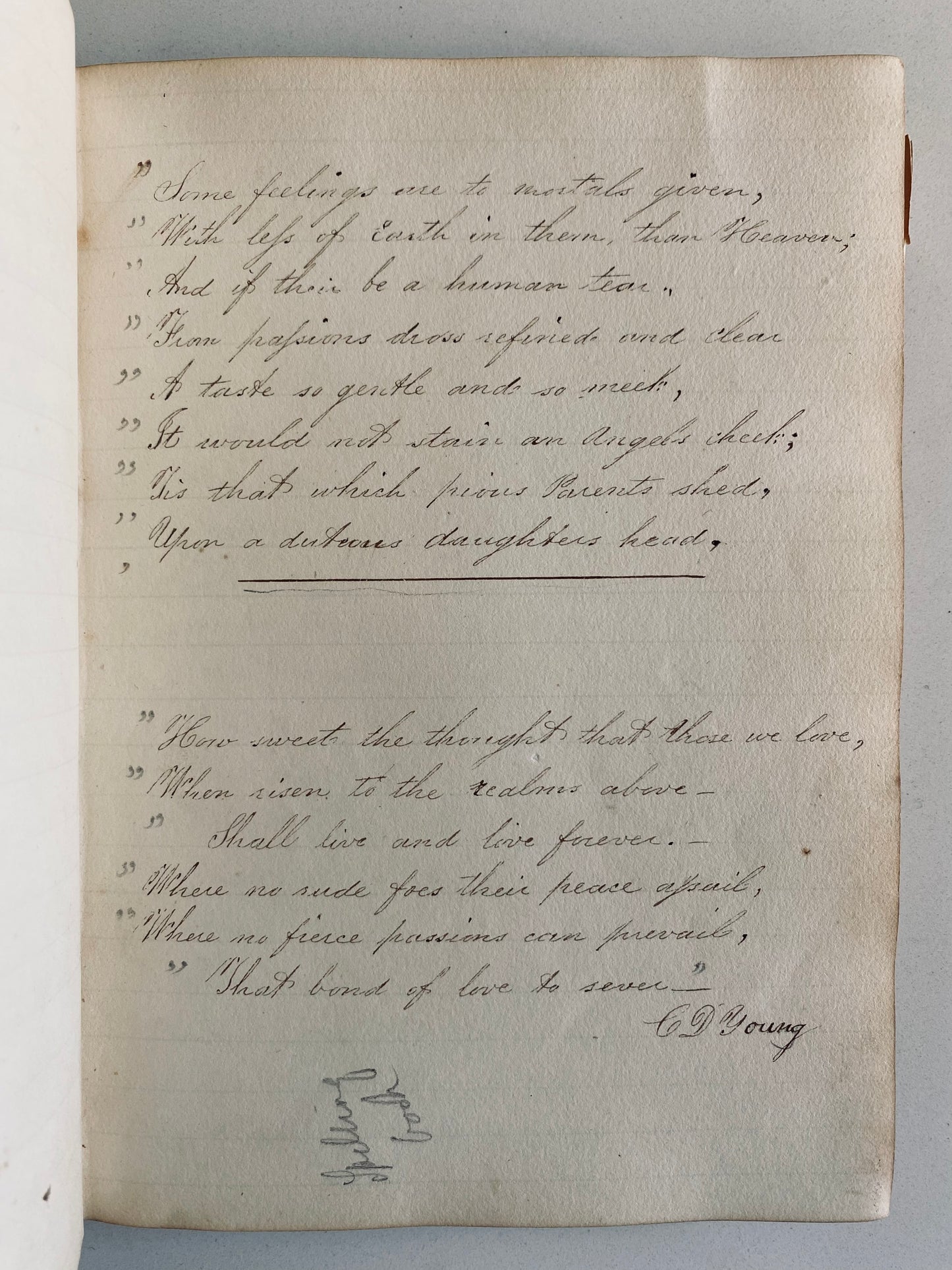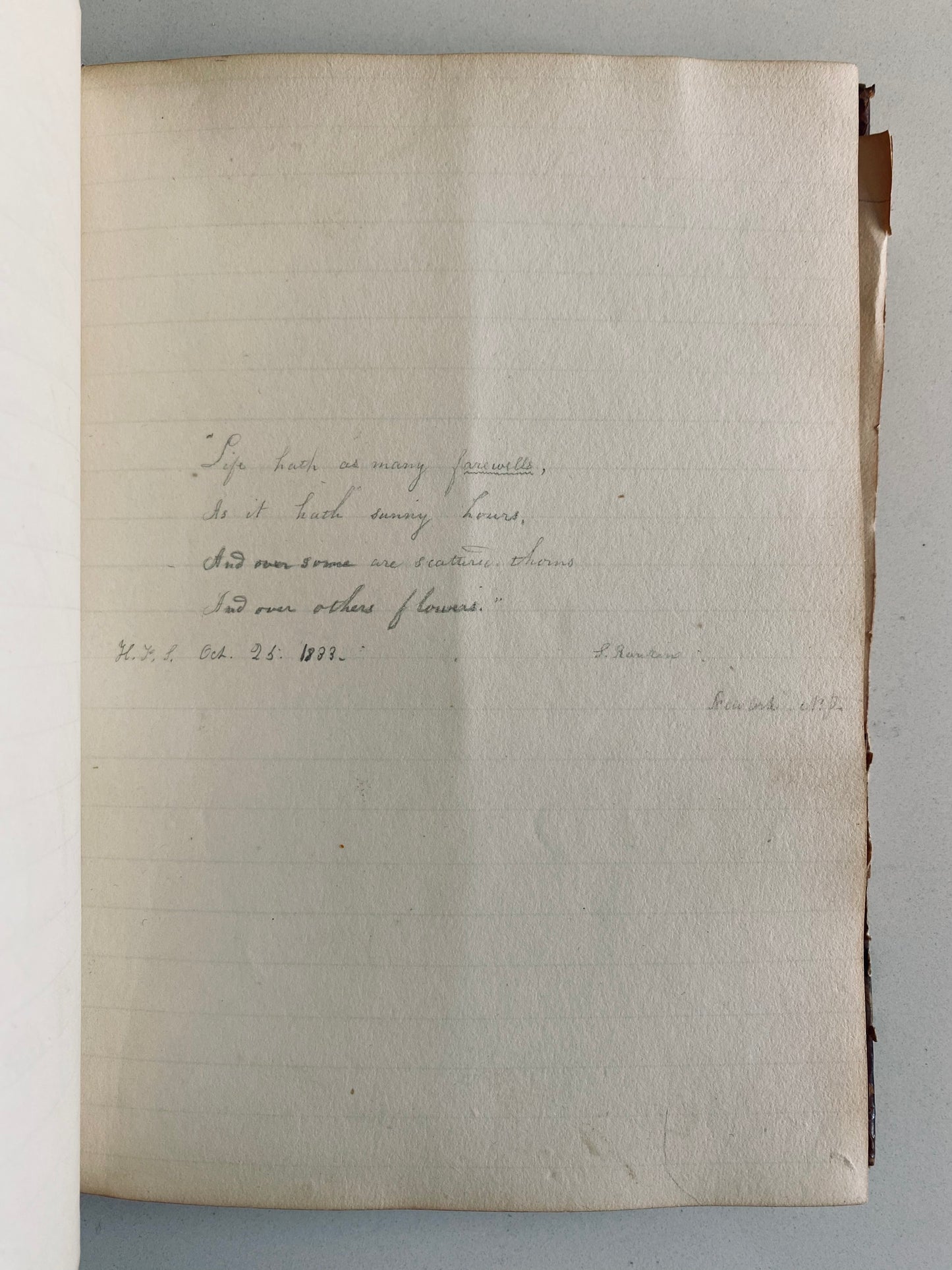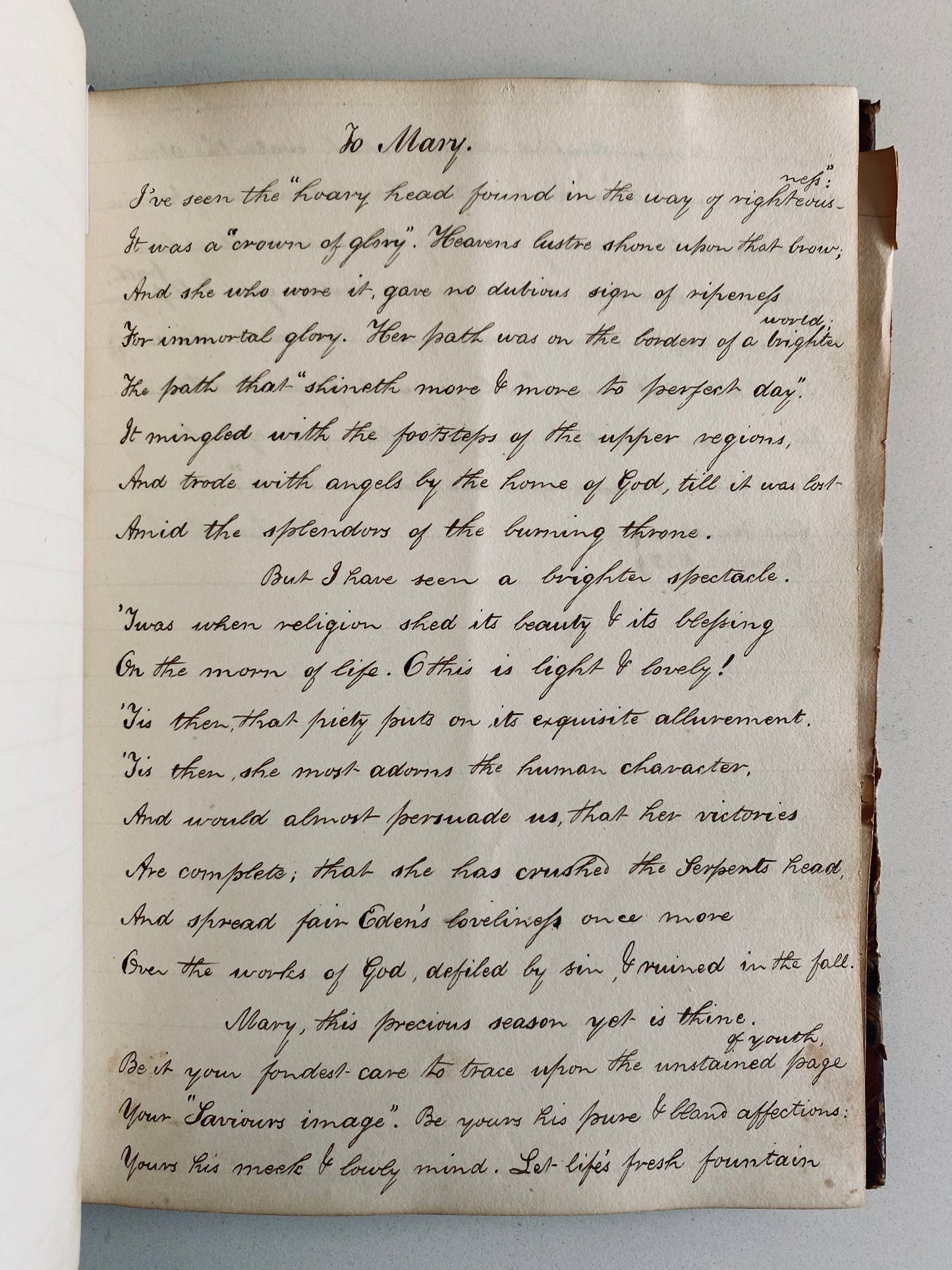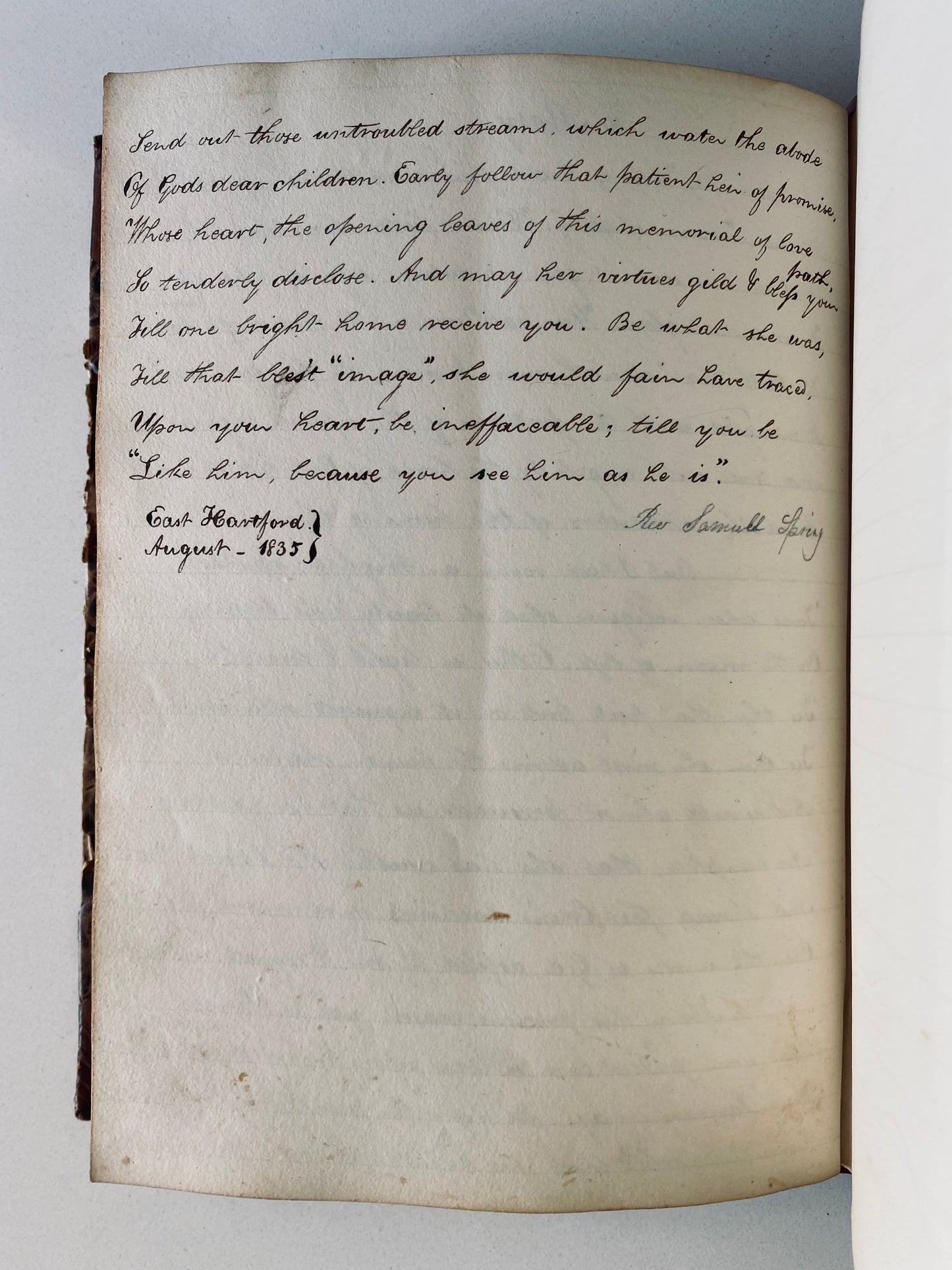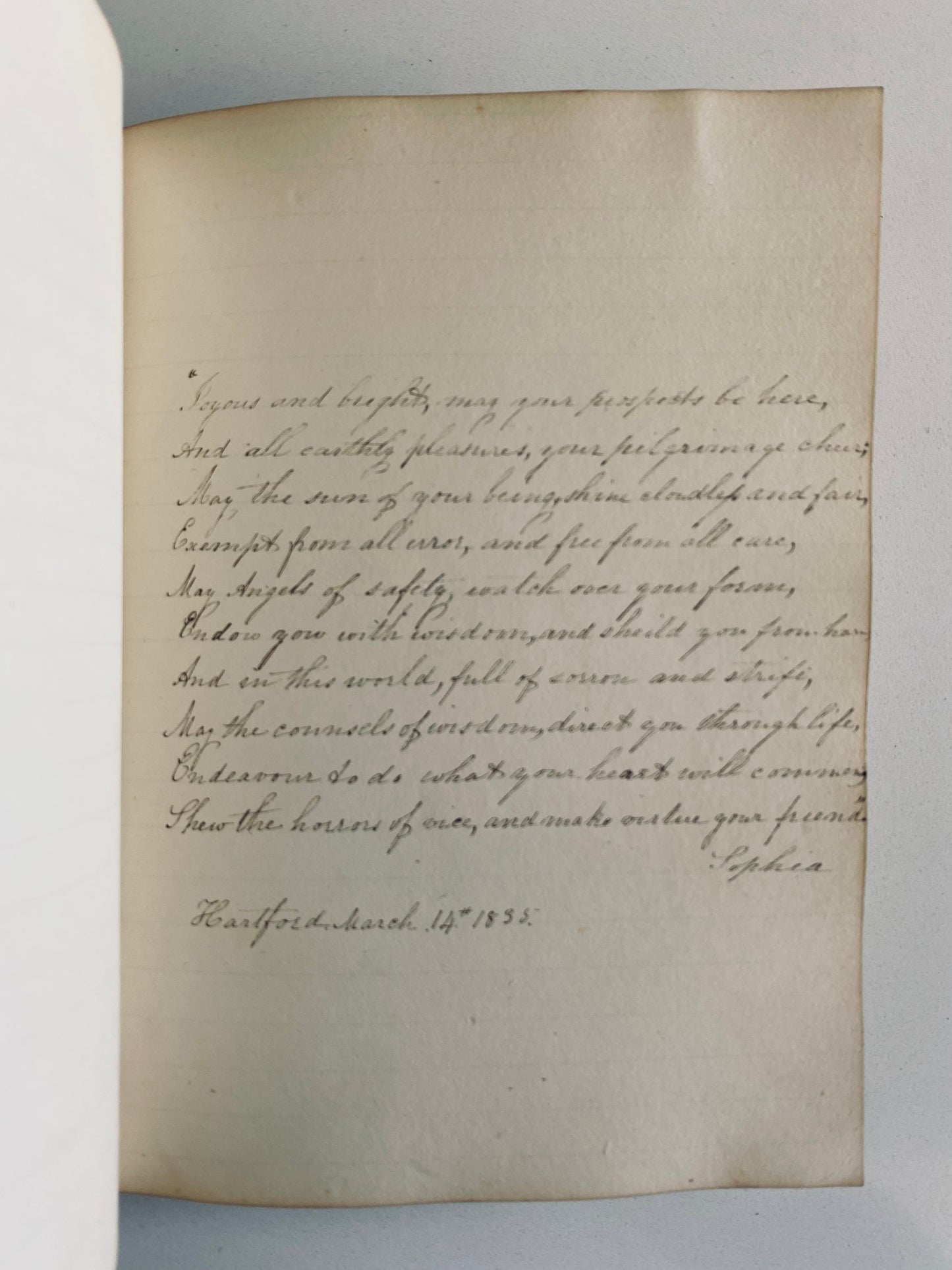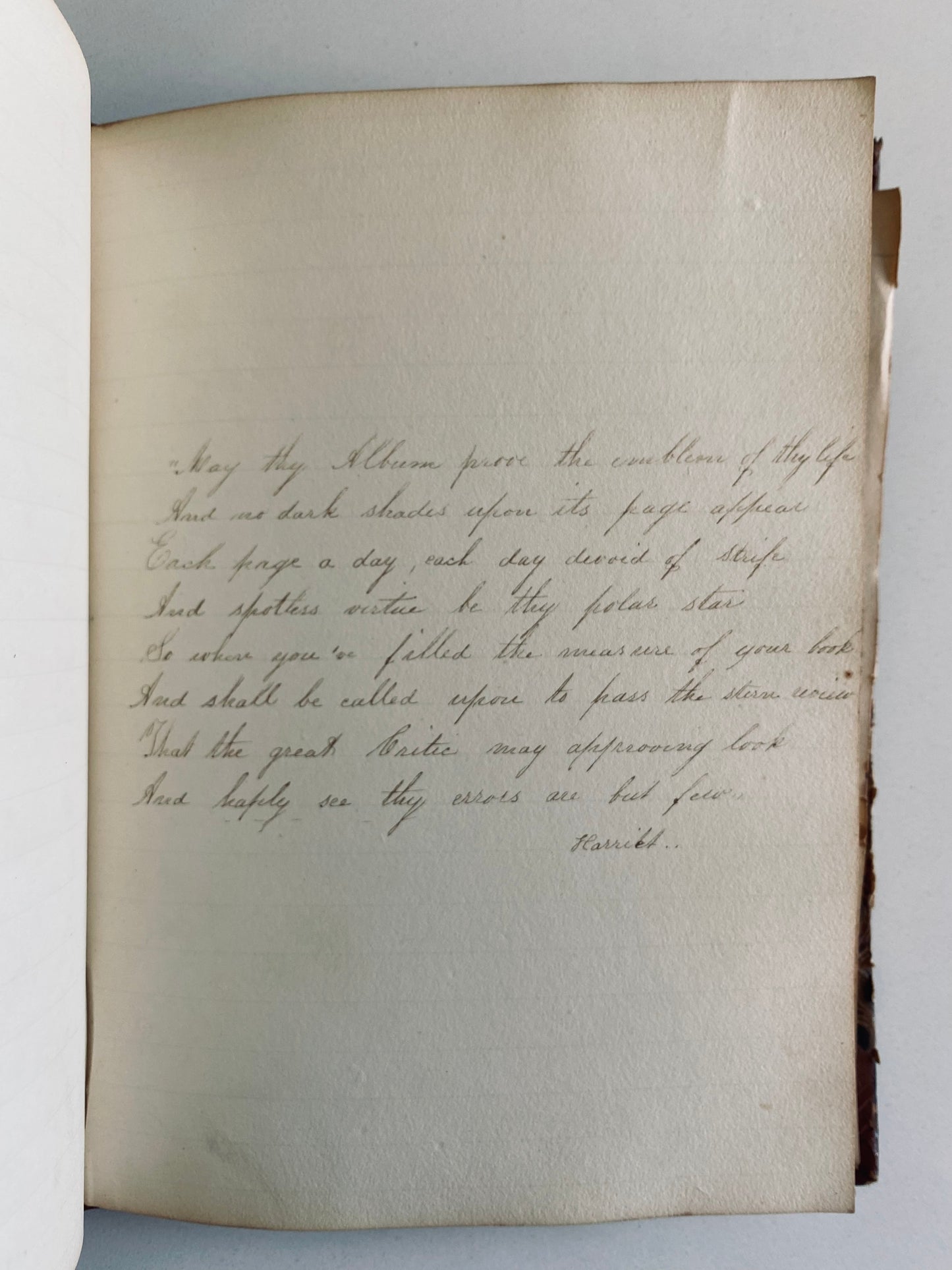Specs Fine Books
1830 HARTFORD FEMALE SEMINARY. Important Autograph Book Including Abolitionists, &c One of First Female Institutions.
1830 HARTFORD FEMALE SEMINARY. Important Autograph Book Including Abolitionists, &c One of First Female Institutions.
Couldn't load pickup availability
A wonderful piece of history from one of the first female educational institutions in the United States and a hotbed of abolitionism.
Hartford Female Seminary in Hartford, Connecticut was established in 1823, by Catharine Beecher, making it one of the first major educational institutions for women in the United States. By 1826 it had enrolled nearly 100 students. It implemented then-radical programs such as physical education courses for women. Beecher sought the aid of Mary Lyon in the development of the seminary. The Hartford Female Seminary closed towards the later half of the 19th century.
The school was first hosted in a third-floor room in a building at Main and Kinsley Streets in Hartford, then in the basement of the North Church. In 1827 the school moved into a new neoclassical building at 100 Pratt Street.
Harriet Beecher Stowe taught at the school beginning in November 1827 and many of its leaders and alumni became leaders in the abolitionist movement.
The present autograph volume belonged to Mary H Terry - Given her by her dear mother. October 13th 1830.
The recipient of our book is noted as Mary H. Terry [1820-1900]. That would be Mary Hall Terry [Later Collins]. Her father, Eliphalet Terry [1776-1849], President of the Hartford Insurance Company. She was cousin to Sarah Terry, who was a known correspondent and friend of Harriet Beecher Stowe's [See Harriet Beecher Stowe. A Life. By Hedrick, p. 407]
She was married to Charles Collins, with their wedding being performed by Horace Bushnell, and was a member of the New York Society of Colonial Dames of America, the Order of the Crown.
The University of Virginia has published an extensive correspondence between Mary and her son, Charles Collins [Jr.], here: Mary Hall Terry Collins letters to her son Charles Terry Collins, 1867 | ArchivesSpace Public Interface (virginia.edu)
The first page includes a poetic inscription from Mary's mother, Lydia Coit Terry. She was born 1788 and died in 1831, just the year after this inscription, during childbirth. She was daughter of Wheeler Coit [Son of Samuel Coit], a wealthy Connecticut merchant.
The next page is a four line poem by her half sister, Sarah Ann Terry Carrington [1814-1881]
Wonderful four stanza poem entitled The Death of a Christian by Reginald Heber, written here and signed by L. A. [Lucy Ann] Reed, later Mrs. William Channing Woodbridge. W. M. Woodbridge and his wife, who had been an educator before their marriage, were some of the most significant educational reformers of the early and mid 19th century. Lucy Ann Reed, before marrying Woodbridge, also served as the Associate Principal of Hartford Female Seminary under T. H. Gallaudet. She and her husband actively campaigned for improvement in the Common schools of Massachusetts. He became a leader in the “Society for the Relief and Improvement of the African Race.” See his biography here: William Channing Woodbridge - Wikipedia. He also worked with the female educational pioneer Emma Hart Willard.
14 line poem [copied] by Mary Ann [Pratt],1813-1880.
An 8 and then a 6 line poem [copied] by Mrs. C. D. Young. She served as Governess of Hartford Female Seminary under T. H. Gallaudet.
Original 20 line poem signed W., then notated as being by D Goodwin
Extensive copied extract on the Bible by "Elizabeth Coit," Mary's aunt.
A playful inscription, "Do not forget your affectionate - Louisa M" Followed by "Have You forgotten me? Mary"
Four line poem by L or S Rankin of Newark New Jersey. [It would be tempting to dig for a connection to Harriet Beecher Stowe's co-abolitionist, John Rankin].
Extensive 1.5pp original extensive inscription to Mary by Rev. Samuel Spring, prominent divine of Hartford, one of the successors to Samuel Hopkins and theologian carrying forward Hopkinsian [or Edwardsian] Theology, along with Nathaniel Emmons, etc. A beautiful ode to and exhortation to youthful piety. Apparently unpublished.
Five line inscription by Cornelia Williams, who later married Thomas William Humes [1815-1892]. He was the President of the University of Tennessee. He had studied for the Presbyterian ministry at Princeton, but was unable to subscribe to the Westminster Confession, so became an Episcopalian in Tennessee. He was removed from the pulpit from 1861-1863 because of Union and Abolitionist sympathies, but returned to the pulpit in 1863, and shot by a secessionist. As President, they called him "limping Jesus" because of his personal piety and his gunshot gimp.
7 stanza poem on love [copied] by Lizzy Strong. Another four stanza in the same hand, signed "E. C. Strong." She was later Elizabeth C. Matson, married to William N. Matson, for many years a prominent Hartford Lawyer [Yale]. He was then a probate judge, recorder for the Connecticut Supreme Court, and left law to join the publishing company S. S. Scranton, where he amassed a fortune.
6 stanza poem signed by Lucretia Spencer
Eight stanza poem signed Elizbeth Spencer
Wonderful 8 stanza poem signed by F[rances] Birge, later Frances Birge Judd. She and her husband, Hall Judd, moved to Northampton, Massachusetts and were a part of the Communitarian Movement and ardent abolitionists, their house to this day is a historic home preserved with its hidden staircase that served as a hiding space and terminal at the end of the Underground Railroad for slaves. Judd had been excommunicated from two churches on the basis of his abolitionist views and historians believe, if anything, Frances was a more ardent abolitionist than he was. [See here: Trailside Family of Companies (trailsidecompanies.com)]
2 stanza poem signed Susan
4 stanza poem by Mrs. [Harriet] F. Webster.
Poem in the hand of Sophia Peck [Later Watson]. Ironically, trained in one of the hotbeds of abolitionism, she met her husband in Hartford, Henry Watson Jr. He would go on to become a rather notorious plantation owner and pro-slavery advocate and one of the largest slave owners in the entire state of Alabama. See here: Henry Watson Jr. - Wikipedia
Signed quotation by Eliza Eldridge
Original inscription to Mary by Mary E[lvira] Elliot of New Haven [advocate and biographer of women's suffrage, etc.]
Poetic inscription by John F. Terry
Inscription of Elizabeth McClure of Philadelphia
Charming, "Recipe for a Lady's Dress" signed Elizabeth, Hartford Female Seminary
A two stanza poem signed, "Elizabeth H."
A charming 8 line poem intriguingly signed "Harriet"
Another four line inscription by Frances Birge, etc. etc. etc.
Share
